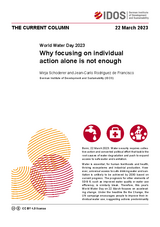World Water Day 2023
Why focusing on individual action alone is not enough
Schoderer , Mirja / Jean-Carlo Rodriguez de FranciscoThe Current Column (2023)
Bonn: German Institute of Development and Sustainability (IDOS), The Current Column of 22 March 2023
Bonn, 22 March 2023. Water security requires collective action and concerted political effort that tackle the root causes of water degradation and push to expand access to safe water and sanitation.
Water is essential, for human livelihoods and health, thriving ecosystems and industrial production. However, universal access to safe drinking water and sanitation is unlikely to be achieved by 2030 based on current progress. The prognosis for other elements of SDG 6, such as improved water quality or water use efficiency, is similarly bleak. Therefore, this year’s World Water Day on 22 March focuses on accelerating change. Under the headline Be the Change, the UN campaign encourages people to improve their individual water use, suggesting actions predominantly at household level. Indeed, freshwater consumption is rising and outstripping recharge rates in many parts of the world and declining water quality threatens the health of humans and ecosystems. However, there are three important caveats to focusing on individual action alone as a means to accelerate change toward water security.
Firstly, it shifts the focus away from urgently needed actions to expand access to water and sanitation for underserved communities and the massive investment gap that prevents them. Currently, one in four people lack access to safe drinking water and 44% of all household wastewater is not safely treated. Limited water services also have strong gendered impacts as women and girls are responsible for water collection in 8 out of 10 households with water off premises. In this context, to call upon individuals to reconsider their water use arguably centers the concerns of high-income countries and affluent areas – where per capita household water consumption does present a sustainability problem – over those of lower-income countries and communities, where expanding access to water and sanitation is paramount.
Secondly, highlighting individual water use gives a skewed impression of the root causes of water degradation. In fact, municipal or household water only accounts for 11% of all water withdrawals globally, while agriculture is responsible for 70% and industry for 17%. Many countries have reliable infrastructures in place to treat wastewater from households but the same does not hold for agriculture or industry. Instead, excess water from agriculture enters groundwater aquifers or surface waters as runoff. Because of heavy fertiliser use, runoff is often contaminated with nitrates, causing algae blooms and polluting aquifers. Industrial wastewater can carry increased loads of heavy metals, hazardous chemicals or other harmful substances that would require intensive treatment to neutralise. Not all countries (especially low- and middle-income ones) have sufficient structures in place to enforce water protection legislation. In consequence, contaminated wastewater often enters watercourses, endangering aquatic biodiversity and the people that rely on them.
Arguably, to reduce water consumption, political action incentivising farmers to apply more efficient irrigation technologies would be more effective than individual measures to save water at the household level. Similarly, promoting less water-intense crops could reduce the need for irrigation. Regarding industrial wastewater, governments across the globe need to deploy regulations and enforcement mechanisms to ensure that it undergoes adequate treatment before discharge. Rather than relying on socially conscious CEOs, doing so should be a minimum requirement for each corporation that seeks to continue using this shared resource. Water use and wastewater discharge licensing presents a powerful instrument in that regard but it requires adequate data as well as enforcement procedures. Similarly, urging citizens to organise clean-ups at riverbanks will not solve the issue of riverine and sea plastic pollution unless governments rapidly legislate a reduced production of single-use plastic and collaborate with businesses to enforce recycling and to encourage sustainable alternatives.
Thirdly and finally, framing World Water Day around individual action neglects the political and social dimensions of water. Across the globe, people join forces to protect or restore water resources. They build, maintain and manage community-based irrigation and water supply systems, and share stories and knowledge on water bodies. In that manner, water builds community and how communities develop in turn affects how water is used. To safeguard water resources, an understanding of this intrinsically social as well as material nature of water is required. Only then can the appropriation of water resources by socially and economically privileged actors to the detriment of less privileged ones be problematised and contested through collective action, which, by definition, goes beyond the individual.
Calling on individuals to improve their water interactions with water might be helpful to tackle overconsumption and pollution in some countries. However, it obfuscates the root causes of water insecurity and the more significant systematic transformations needed to tackle them. In that manner, rather than to accelerate change, this year’s motto seems posed to perpetuate the status quo.



